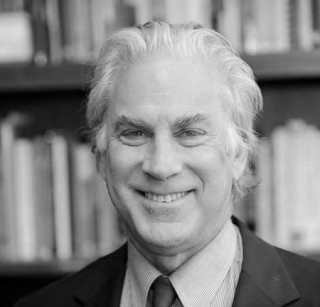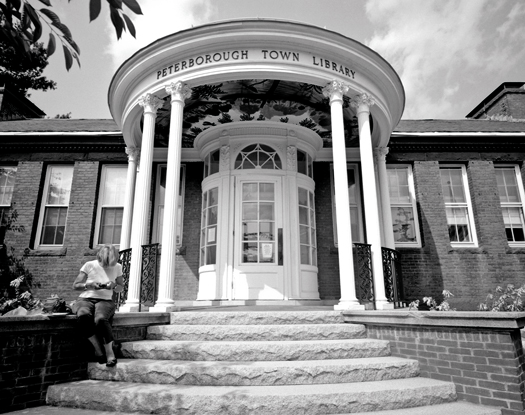
First, tax-supported public library, Peterborough Town Library, Peterborough, New Hampshire, 2009. All images © Robert Dawson
Editor's Note: The following is an excerpt from David Morris's essay "All Hail the Public Library", one of many wonderful essays in the new book The Public Library: A Photographic Essay, out now from Princeton Architectural Press. The excerpt and slideshow of images are reprinted here with permission of the publisher.
The public library is a singularly American invention. Europeans had subscription libraries for one hundred years before the United States was born. But on a chilly day in April 1833, the good citizens of Peterborough, New Hampshire, created a radical new concept ― a truly public library. All town residents, regardless of income, had the right to freely share the community’s stored knowledge.
By the 1870s eleven states boasted 188 public libraries all combined. By 1910 all states had them. Today almost nine thousand central buildings, plus about seventy-five hundred branches, have made public libraries one of the most ubiquitous of all American institutions. A 2011 Harris poll showed that about 65 percent of us had visited a public library at least once in the past year.

Central Library, Seattle, Washington, 2009
Since its inception, the American public library’s prime directive has been to protect the public’s access to information. In 1894 the right to know led Denver’s public library to pioneer the concept of open stacks. For the first time, patrons had the freedom to browse. In the 1930s the right to know led Kentucky’s librarians to ride pack horses and mules with saddlebags filled with books into remote areas of the state. In 1872 the right to know led the Worcester, Massachusetts, public library to open its doors on Sunday. Many viewed that as sacrilege. Head librarian Samuel Green calmly responded that a library intended to serve the public could do so only if it were accessible when the public could use it. More than 125 years later, Sundays remain the busiest day of the week for public libraries.
Despite their enormous popularity and widespread use, public libraries have rarely been well funded. “Libraries are plagued by the image that we are nice, but not essential,” one librarian complained to the Washington Post. People will defend their libraries, but only when the lights are about to go out.
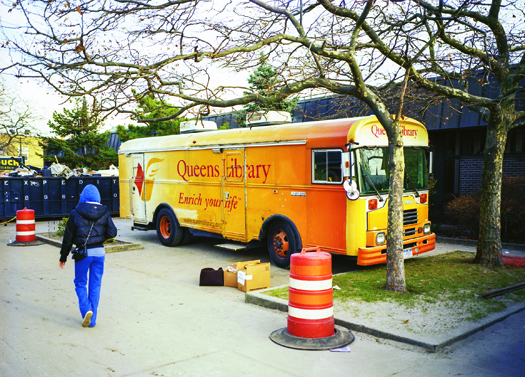
After Hurricane Sandy, Queens Library bookmobile, the Rockaways, Queens, New York, 2012
And the lights are beginning to go out. Nineteen states cut funding for public libraries in 2011. More than half of the reductions were greater than 10 percent.
In what will undoubtedly be a protracted and bruising fight to expand America’s public libraries in a time of financial distress, librarians themselves should not be expected to take the lead. The public should.
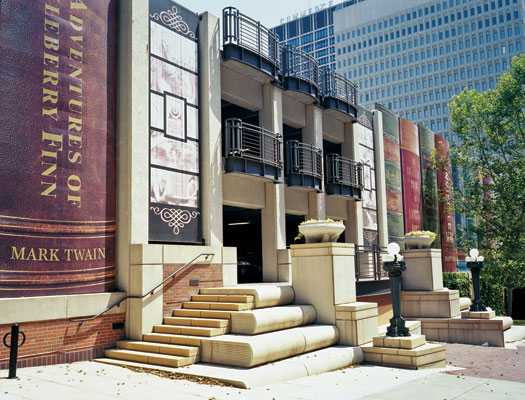
Book mural on parking structure near Central Library, Kansas City, Missouri, 2012
Because most libraries get 90 percent of their funding from local taxes, grassroots initiative can have a major impact. When activists have managed to put a library-funding measure on the ballot, they usually win. In 2010 some 87 percent of these ballot initiatives were approved across the country. We need a grassroots effort to defend our public libraries.
Such efforts have begun. In Bedford, Texas, after a communitywide petition campaign to oppose library outsourcing gathered seventeen hundred signatures in four days, city council members voted 4 to 3 to reject privatization.
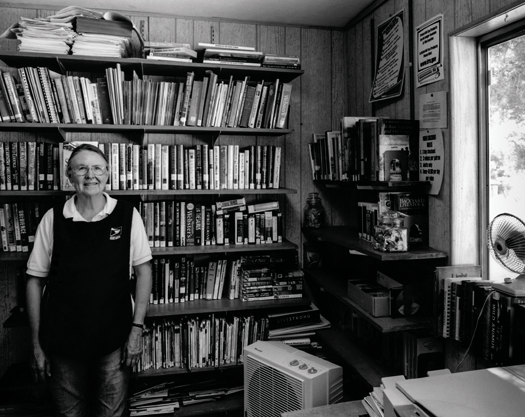
Woman in charge of Post Office/Library, Tuscarora Branch Library, Tuscarora, Nevada, 2009
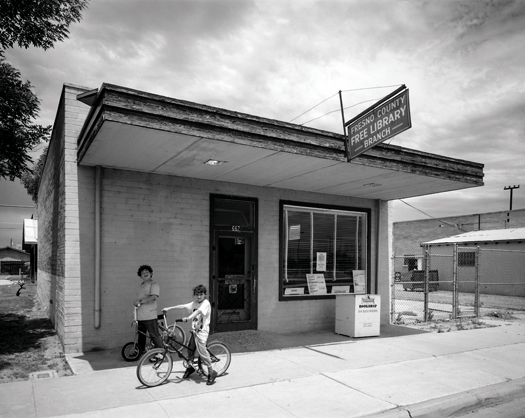
Fresno County Public Library, Mendota, California, 1994
In Philadelphia grassroots organizations such as Coalition to Save the Libraries sprang up in 2008, after the city, without a formal vote of the city council, announced it was going to close eleven library branches. Residents of nine of the affected neighborhoods plus several city council members filed suit, citing a 1988 ordinance that no city-owned facility may close, be abandoned, or go into disuse without city council approval. After two days of hearings packed with library supporters and just hours before the mandated closure, Judge Idee C. Fox granted an injunction against the closures. In her ruling, Judge Fox made clear the city’s decision was about more than money, “The decision to close these eleven library branches is more than a response to a financial crisis; it changes the very foundation of our city.”
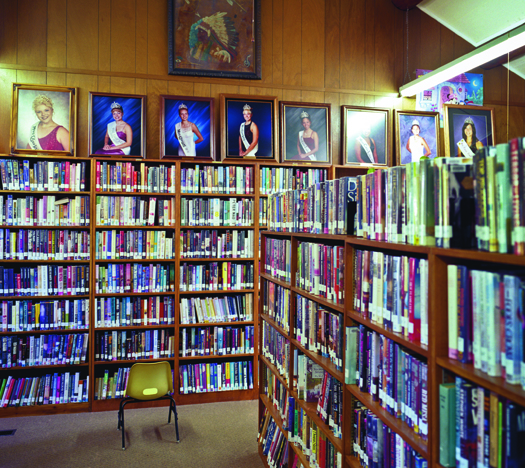
Miss Cass Lake winners, Cass Lake Community Library, Cass Lake, Minnesota, 2012
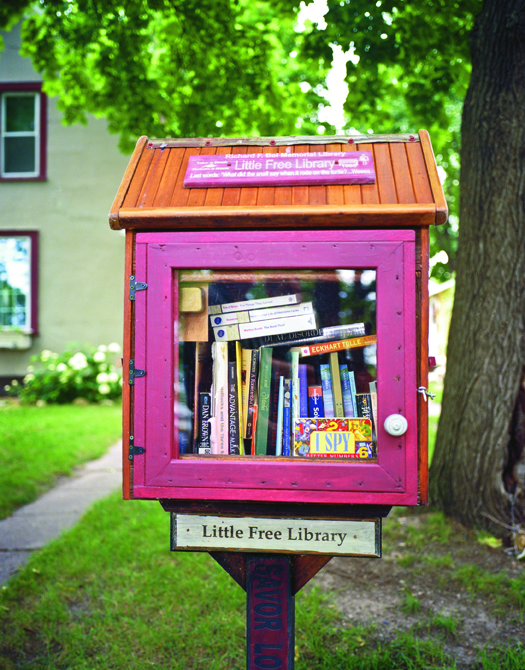
Richard F. Boi Memorial Library, First Little Free Library, Husdon, Wisconsin, 2012
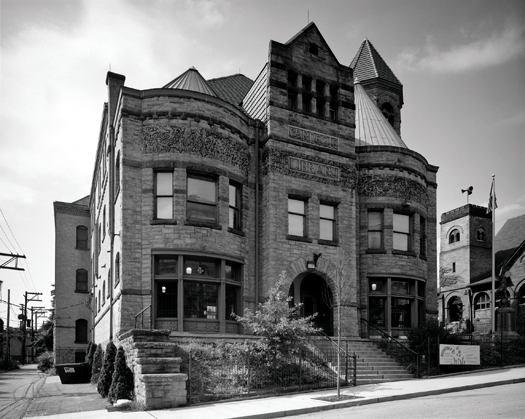
First Carnegie library: the Braddock Carnegie Library, Braddock, Pennsylvania, 2011

